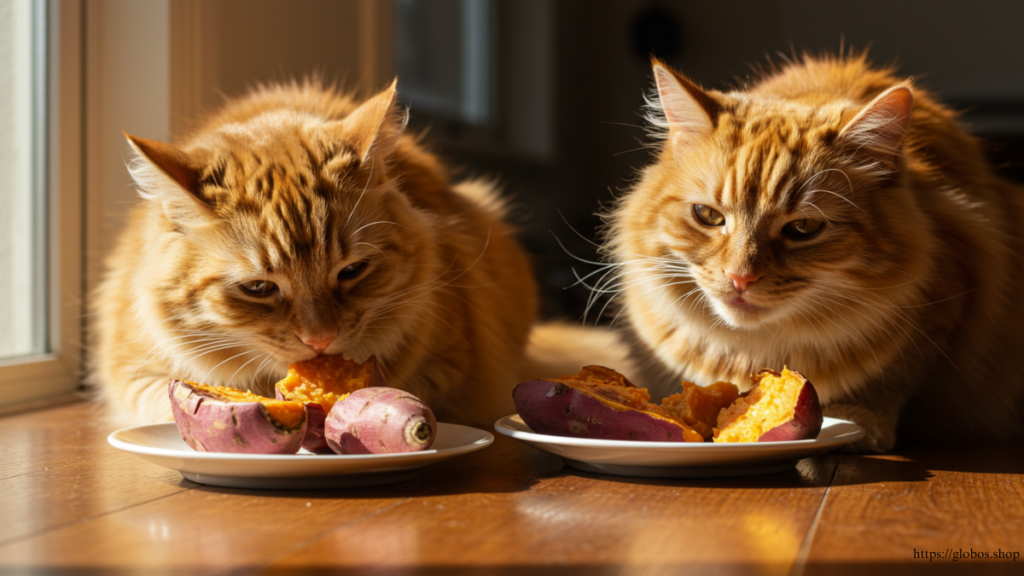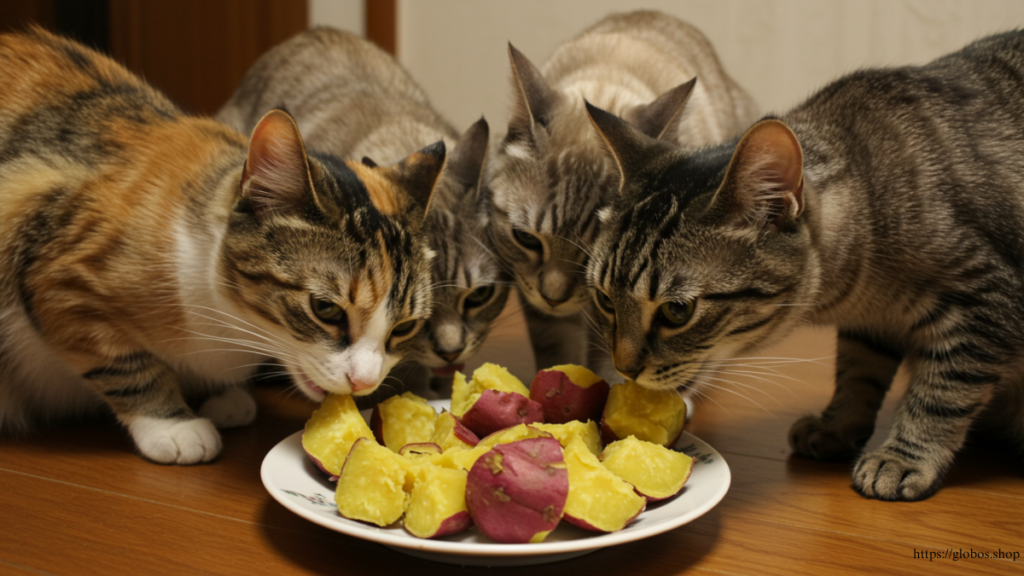If you’re a cat owner who loves sharing food with your furry friend, you might be wondering: Can cats eat sweet potatoes? Sweet potatoes are a healthy and delicious treat for humans, but are they safe for cats? In this article, we’ll explore whether sweet potatoes are a good choice for your feline companion, the potential benefits and risks, and how to safely introduce them into your cat’s diet. Let’s dive in!

1. Can Cats Eat Sweet Potatoes?
The short answer is yes, cats can eat sweet potatoes, but only in moderation and under certain conditions. Sweet potatoes are not toxic to cats, but they are not a natural part of a cat’s diet. Cats are obligate carnivores, which means their bodies are designed to thrive on a meat-based diet. While sweet potatoes can provide some nutritional benefits, they should never replace the protein-rich food that cats need.
If you’re considering giving your cat sweet potatoes, it’s important to prepare them properly and serve them in small amounts. Let’s take a closer look at the benefits and risks.
2. Nutritional Benefits of Sweet Potatoes for Cats
Sweet potatoes are packed with nutrients that can be beneficial for both humans and cats. Here are some of the key nutrients found in sweet potatoes:
- Fiber: Helps with digestion and can prevent constipation.
- Vitamin A: Supports eye health and immune function.
- Vitamin C: Acts as an antioxidant and boosts the immune system.
- Potassium: Helps maintain healthy muscles and nerves.
- Beta-Carotene: Converts to vitamin A and supports overall health.
While these nutrients are beneficial, it’s important to remember that cats have different dietary needs than humans. They require more protein and fewer carbohydrates, so sweet potatoes should only be an occasional treat.
3. Potential Risks of Feeding Sweet Potatoes to Cats
Although sweet potatoes are not toxic to cats, there are some risks to be aware of:
- Digestive Issues: Cats have short digestive tracts designed for processing meat, not carbohydrates. Too much sweet potato can cause stomach upset, diarrhea, or vomiting.
- Obesity: Sweet potatoes are high in calories and carbohydrates, which can contribute to weight gain if fed in excess.
- Choking Hazard: Raw sweet potatoes are hard and difficult for cats to chew, posing a choking risk.
- Seasonings and Additives: Sweet potatoes prepared with butter, salt, sugar, or spices can be harmful to cats. Always serve them plain and cooked.
To avoid these risks, always feed sweet potatoes in moderation and prepare them properly.
4. How to Safely Feed Sweet Potatoes to Your Cat
If you decide to give your cat sweet potatoes, follow these guidelines to ensure their safety:
- Cook the Sweet Potatoes: Raw sweet potatoes are hard to digest and can be a choking hazard. Always cook them until they are soft.
- Serve Plain: Avoid adding butter, salt, sugar, or spices. These additives can be harmful to cats.
- Mash or Cut into Small Pieces: Make it easier for your cat to eat by mashing the sweet potatoes or cutting them into small, bite-sized pieces.
- Start Small: Introduce sweet potatoes slowly and in small amounts to see how your cat reacts.
- Monitor for Allergies: Watch for signs of an allergic reaction, such as itching, swelling, or difficulty breathing.
Remember, sweet potatoes should only be an occasional treat, not a regular part of your cat’s diet.
5. Alternatives to Sweet Potatoes for Cats
If you’re looking for healthier or more cat-friendly alternatives to sweet potatoes, consider these options:
- Pumpkin: Plain, cooked pumpkin is a great source of fiber and is often recommended for cats with digestive issues.
- Carrots: Cooked carrots are safe for cats and provide similar nutrients to sweet potatoes.
- Green Beans: Low in calories and high in fiber, green beans can be a healthy treat for cats.
- Commercial Cat Treats: Look for high-quality, protein-based treats designed specifically for cats.
These alternatives are safer and more aligned with your cat’s nutritional needs.
6. FAQs About Cats and Sweet Potatoes

Q1: Can cats eat sweet potatoes every day?
No, sweet potatoes should only be an occasional treat. Cats need a meat-based diet to thrive, and too many carbohydrates can lead to health issues.
Q2: Are sweet potatoes toxic to cats?
No, sweet potatoes are not toxic to cats, but they should be fed in moderation and prepared properly.
Q3: Can cats eat raw sweet potatoes?
No, raw sweet potatoes are hard to digest and can be a choking hazard. Always cook them before feeding.
Q4: Can sweet potatoes cause allergies in cats?
While rare, some cats may have an allergic reaction to sweet potatoes. Monitor your cat closely when introducing new foods.
Q5: Are sweet potatoes good for cats with digestive issues?
In small amounts, cooked sweet potatoes can help with digestion due to their fiber content. However, consult your vet before making dietary changes.
Conclusion

So, can cats eat sweet potatoes? Yes, but only in moderation and when prepared properly. Sweet potatoes are not toxic to cats, but they are not a natural part of their diet. While they can provide some nutritional benefits, they should never replace the protein-rich food that cats need. Always serve sweet potatoes plain, cooked, and in small amounts to avoid potential risks.
If you’re looking for healthier alternatives, consider options like pumpkin, carrots, or commercial cat treats. And as always, consult your veterinarian before introducing new foods into your cat’s diet. Your furry friend’s health and happiness are worth it!

John David is a passionate pet lover and holds a PhD in Environmental Engineering. Combining his love for animals with his scientific expertise, John provides valuable insights into pet care, behavior, and health. With extensive knowledge about dogs, cats, and pet insurance.
